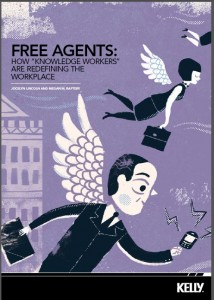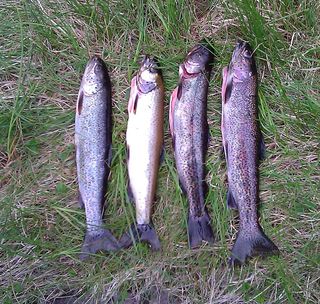A couple of weeks ago, I wrote a blog that boldly stated that the publication of some recent articles (one most notably in USA Today) about an increased number of people becoming entrepreneurs, was probably a false trend.
 Well, I might have been wrong… As I researched this topic some more, I found some additional data that may be very good news for the real estate industry. Kelly Services, an internal staffing and Human Resources consulting company, recently published research that documents a significant trend toward employees becoming “free agents” in today’s job market.
Well, I might have been wrong… As I researched this topic some more, I found some additional data that may be very good news for the real estate industry. Kelly Services, an internal staffing and Human Resources consulting company, recently published research that documents a significant trend toward employees becoming “free agents” in today’s job market.
This topic was highlighted in a recent ERE article written by John Zappe. Here’s how John summazied the research:
“The number of 'free agent' workers has nearly exploded in the last three years, and now 44 percent of working Americans describe themselves that way. A Kelly Services survey says economic necessity, the desire for more freedom and flexibility, and age have driven up the number of workers not tied to a single company for their livelihood. It’s a dramatic change from 2008, when Kelly’s survey found 26 percent of workers describing themselves as free agents.”
That’s a trend worth noticing. When an employment statistic goes from 26 percent to 44 percent in just three years, something is changing. So, what’s changing? The research addresses some causes:
“A significant driver is the economy. Respondents to the 2011 survey were twice as likely as their counterparts in 2008 to say they became free agents because they were laid off or couldn’t find another job. …Also fueling the rise is the increasing reliance of American business on contingent and contract labor, say the authors of a whitepaper detailing the results. Companies, note Jocelyn Lincoln and Megan M. Raftery, 'can scale up and down faster and easier by adopting more flexible workforce strategies.'”
So, lots of workers have been laid off in the last three years, and many companies are hesitant to commit to a typical employee relationship as they rehire to meet their needs. So, how does that help the real estate industry?
What used to be strange (working as an independent contractor) is now becoming much more normal.
The research goes on to highlight one other issue that I thought was worth noting—the “quality” of the typical independent contractor. Are these folks all the corporate losers who can’t keep a job? Not according to the research:
“More than one-third of all free agents have earned a master’s degree or higher, and compared with traditional employees, more free agents (77% compared to 62% for traditional employees) possess technical or professional skill set. What does this trend mean for American business? It means there’s a huge pool of available talent in nearly every discipline and industry for employers to tap.”
So how do you go about tapping this great pool of talent? The Kelly Services researchers found three trends:
- Money. You need to offer opportunities that reliably produce cash for the independent contractor. Remember that you’re competing for the attention of the best candidates with other companies that do compensate for verifiable skills and results.
- Type of Work/ Quality of the Project. We talk frequently in WorkPuzzle about the tendency of individuals to languish in their jobs. Be ready to address this issue. Will the individual find the work you’re asking them to do interesting and engaging? This needs to be a major theme of the interview.
- Reputation of the Company. This one surprised me. I suspect that talented people who operate as free agents want to be associated with organizations who (in their own mind) match their level business acumen. The more prominent and trusted your company’s brand, the higher the level of talent you’ll be able to attract and engage.
The final thing worth noting is that many talented free agents have multiple jobs. While it is the desire of many real estate companies to hire full-time agents, it may be difficult to get someone to a full-time status without first taking some babysteps. The facts are that kids have to be fed, mortgages have to be paid, and most talented free agents want a “project” to grow into a fulltime obligation—not be deemed one from the start. That’s too risky and doesn’t fit the free agent’s mindset.
Your homework…study the free agent trend and be able to speak about it during interviews and other recruiting conversations. It is one of the few truly positive trends that could directly help the real estate industry.
Editor's Note: This article was written by Ben Hess. Ben is the Founding Partner and Managing Director of Tidemark, Inc. and a regular contributor to WorkPuzzle. Comments or questions are welcome. If you're an email subscriber, reply to this WorkPuzzle email. If you read the blog directly from the web, you can click the "comments" link below.














